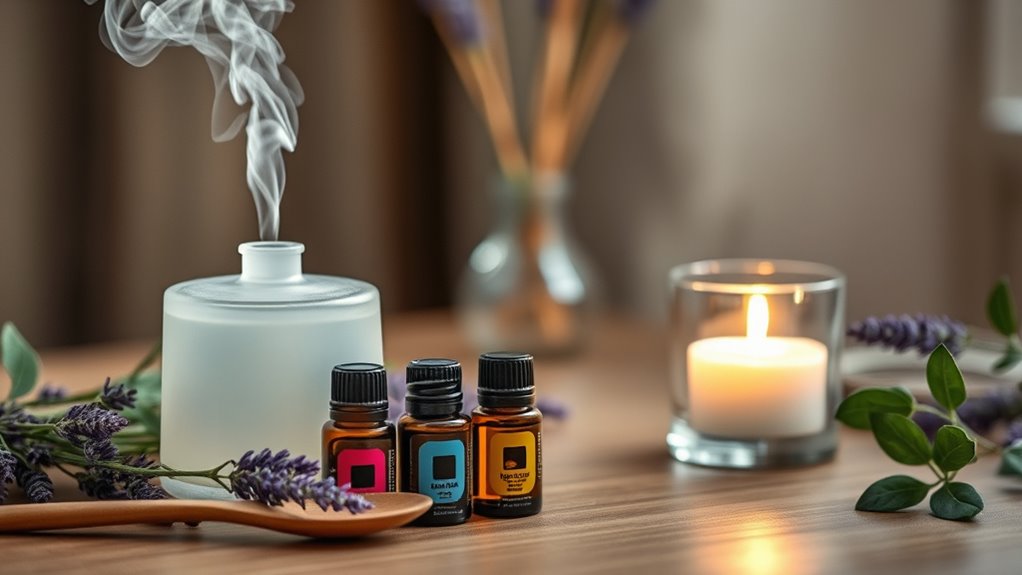Aromatherapy is backed by science as an effective way to reduce stress and boost mood by stimulating your brain’s emotional centers through inhaling essential oils like lavender, chamomile, and bergamot. These scents activate neurotransmitters such as serotonin and dopamine, helping you feel calmer and more balanced. You can incorporate oils into your daily routine via diffusers, sprays, or personal inhalers. Keep in mind safety tips, and you’ll find simple DIY blends that support relaxation—discover how to make them for yourself now.
Key Takeaways
- Aromatherapy stimulates the limbic system, helping regulate emotions and reduce stress through scent inhalation.
- Essential oils like lavender, chamomile, and bergamot are supported by studies for their calming and mood-enhancing effects.
- DIY blends combining herbs and oils can be used via diffusers, sprays, or inhalers to promote relaxation.
- Proper dilution (2-3 drops per teaspoon of carrier oil) and safe storage prevent skin irritation and preserve efficacy.
- Emerging research and advanced scent technologies aim to improve personalized, evidence-based aromatherapy stress relief methods.
The Science Behind Aromatherapy and Stress Reduction
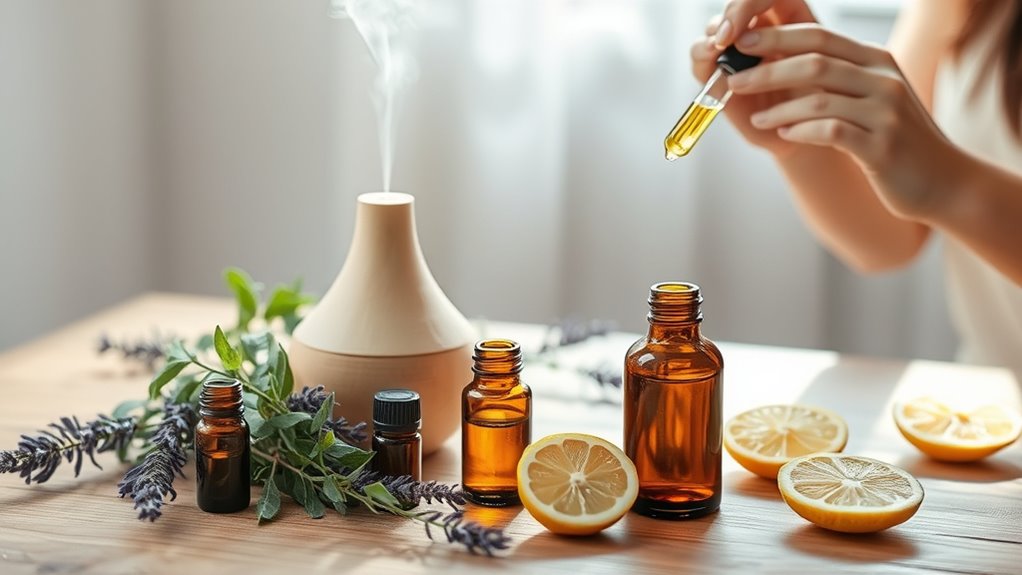
Aromatherapy works by stimulating your olfactory system, which sends signals directly to the brain’s limbic system—the area responsible for emotions and memory. When you inhale essential oils, your brain responds by modulating neurotransmitters like serotonin and dopamine, which influence mood and stress levels. This process, known as neurotransmitter modulation, helps balance chemicals that affect how you feel. Additionally, scent exposure triggers hormonal regulation, reducing stress hormones like cortisol. The calming properties of specific aromas can help you feel more relaxed by influencing these biochemical pathways. Understanding this scientific basis explains why certain scents can quickly ease tension and promote emotional well-being, making aromatherapy a natural approach to managing stress through direct effects on your brain’s chemistry.
Common Essential Oils Known for Calming Effects
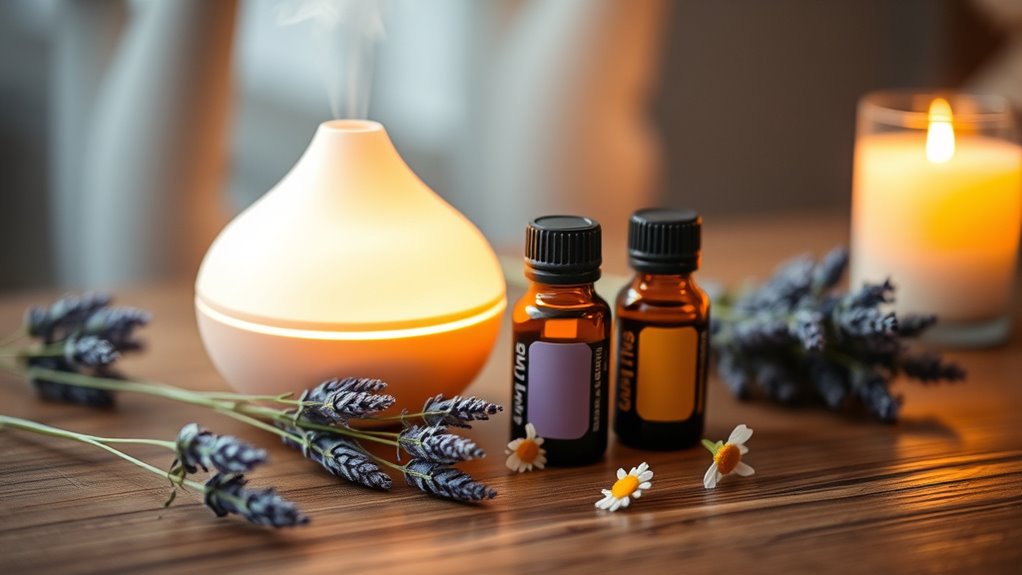
Lavender is renowned for its relaxing qualities, helping to ease tension and promote restful sleep. Chamomile offers soothing benefits that calm your mind and reduce anxiety. Bergamot’s uplifting aroma can lift your spirits while still providing a calming effect. Additionally, incorporating aromatherapy techniques can enhance these calming effects and create a more peaceful environment.
Lavender’s Relaxing Qualities
Have you ever noticed how the scent of lavender instantly calms your mind? This is no coincidence—lavender’s relaxing qualities have been appreciated for centuries. Lavender cultivation dates back thousands of years, with ancient civilizations like the Egyptians and Romans using it for its soothing effects and pleasant aroma. Its history reveals a long-standing recognition of lavender’s calming power. The essential oil is extracted from the flowering tops, capturing its gentle, floral scent known to reduce stress and promote relaxation. When you breathe in lavender’s aroma, you activate your nervous system’s calming response, helping to ease anxiety and improve sleep. Its proven relaxing qualities make lavender one of the most popular essential oils for stress relief and emotional balance. Additionally, modern sound design techniques like ambient soundscapes can complement aromatherapy by creating a calming environment that enhances relaxation.
Chamomile’s Soothing Benefits
Just as lavender’s scent can soothe your nerves, chamomile offers similar calming benefits through its gentle aroma. You can incorporate chamomile into your relaxing routines with herbal tea, which helps ease tension and promote restful sleep. The aroma of chamomile essential oil also creates a peaceful environment, reducing anxiety and promoting mental clarity. Diffusing chamomile or adding a few drops to your bath can enhance your stress relief efforts. Its soothing properties are well-known for calming nerves and easing restlessness. Whether you enjoy a warm cup of herbal tea or use the oil in your diffuser, chamomile supports your goal of creating a serene, stress-free space. Its gentle scent is perfect for unwinding after a hectic day or preparing for restful sleep.
Bergamot’s Uplifting Aroma
Bergamot’s uplifting aroma is a popular choice for promoting calmness and reducing stress. Its citrus scent energizes your mind while soothing your nerves, making it ideal for stress relief. The fresh, zesty aroma helps lift your mood and combat feelings of anxiety. When you diffuse bergamot essential oil, you create an environment that encourages relaxation and mental clarity. Its vibrant citrus scent acts as a natural antidepressant, helping you feel more balanced and focused. You can also add a few drops to a carrier oil for a calming massage or blend it into your diffuser for an invigorating aroma that promotes emotional well-being. Incorporating bergamot’s uplifting aroma into your routine can make a significant difference in managing daily stress. Additionally, understanding market demand for certain essential oils can help you select the most effective options for your aromatherapy practices.
How Aromatherapy Influences the Brain and Mood
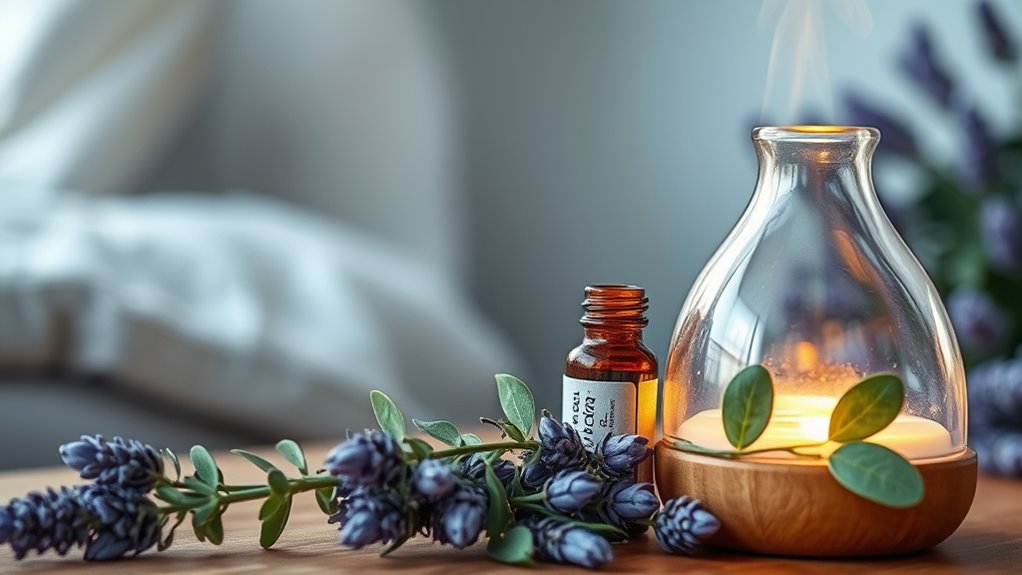
Aromatherapy impacts the brain and mood primarily through the olfactory system, which detects essential oils and translates their molecules into signals that reach various brain regions. These signals influence neurotransmitter modulation, affecting how you feel and respond emotionally. When you inhale calming scents like lavender, they stimulate areas linked to emotional regulation, promoting relaxation. Imagine a pathway where scent molecules act as messengers, connecting your nose to your brain’s emotional centers. Here’s a visual:
| Scent Molecule | Brain Region | Effect |
|---|---|---|
| Lavender | Amygdala | Reduces anxiety |
| Peppermint | Hypothalamus | Enhances alertness |
| Chamomile | Prefrontal Cortex | Promotes calm |
| Eucalyptus | Limbic System | Eases stress |
| Rose | Hippocampus | Improves mood |
Additionally, understanding how different scents influence brain activity can enhance your essential oil use for targeted stress relief.
Practical Tips for Incorporating Aromatherapy Into Daily Life
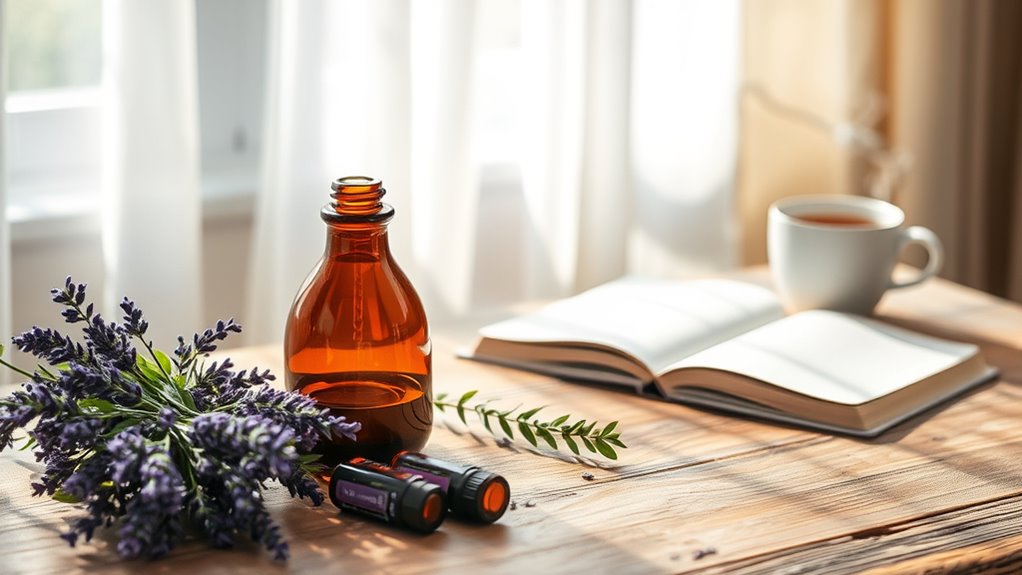
Incorporating aromatherapy into your daily routine can be a simple and effective way to harness its stress-relieving benefits. Start by practicing mindful breathing with your favorite essential oils, inhaling deeply to center yourself during moments of stress. You can also incorporate aromatic journaling, where you write about your feelings while diffusing calming scents nearby, helping you reflect and relax. Keep a small diffuser at your workspace or bedside to create a soothing environment throughout the day. Use a personal inhaler for quick relief or add a few drops of essential oil to your bath for a calming soak. Consistency is key—integrate these practices into your daily schedule to cultivate a peaceful mindset and enhance your overall well-being. Additionally, understanding the role of scent in relaxation can help you select the most effective essential oils for stress relief.
Easy DIY Aromatherapy Blends for Stress Relief
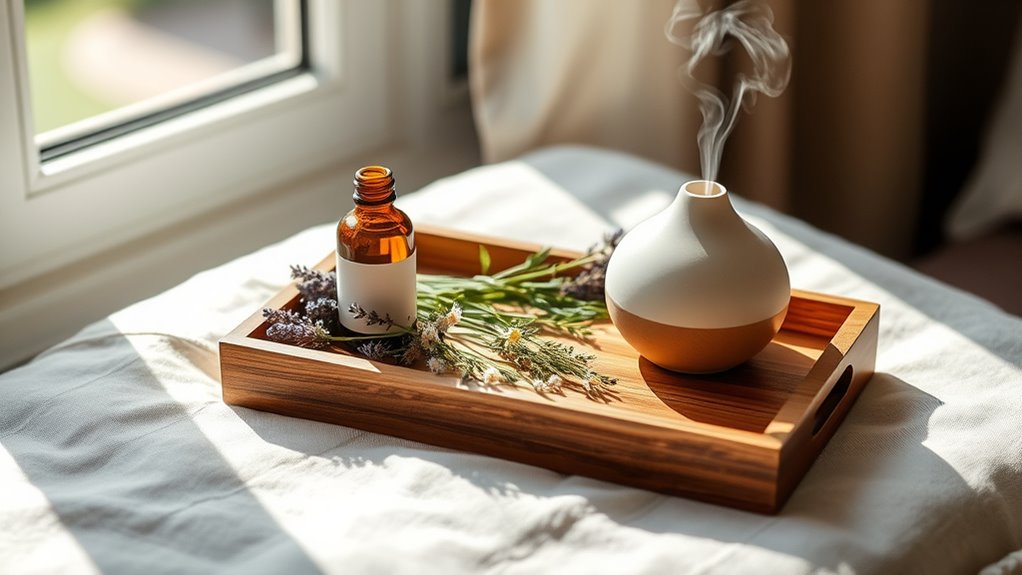
Looking for simple, effective ways to create your own stress-relief blends at home? Try combining herbal teas like chamomile or lavender with essential oils such as frankincense or bergamot to craft calming DIY blends. Incorporate these into your daily routine by sipping herbal teas during meditation practices, enhancing relaxation. You can also add a few drops of essential oils to a diffuser or create a spray for your space. These blends are easy to customize based on your preferences and needs. Using herbal teas alongside aromatherapy can deepen your sense of calm and mindfulness. Keep it simple: a warm cup of tea paired with a short meditation session can considerably reduce stress and elevate your mood. Additionally, incorporating aromatherapy into your self-care routine can boost overall well-being and emotional resilience.
Safety Guidelines and Best Practices

You should always follow proper dilution techniques to prevent skin irritation or adverse reactions. Store your essential oils in dark, airtight containers away from heat and sunlight to maintain their potency. Additionally, proper storage helps preserve the quality of the oils, ensuring their effectiveness over time. By practicing these safety measures, you can enjoy the benefits of aromatherapy confidently and safely.
Proper Dilution Techniques
Proper dilution is essential to guarantee safe and effective use of essential oils in aromatherapy. You should always mix essential oils with carrier oils to prevent skin irritation and ensure proper absorption. When determining essential oil ratios, consider the application and individual sensitivity. For topical use, a common ratio is 2-3 drops of essential oil per teaspoon of carrier oil, which balances potency with safety. For massage or body blends, you might increase the dilution slightly, but never exceed recommended levels. Always perform a patch test before broader application. Remember, concentrated essential oils are potent; proper dilution minimizes risks and maximizes benefits. Following these guidelines helps you enjoy aromatherapy safely while harnessing the full stress-relief potential of your blends. Additionally, understanding the impact of proper dilution on overall safety can help prevent adverse reactions and ensure a more effective stress-relief experience.
Essential Oil Storage Tips
Storing your essential oils correctly is key to maintaining their quality and safety over time. Keep your essential oil storage in a cool, dark place away from direct sunlight and heat, which can degrade the oils. Use dark glass bottles to prevent light exposure and ensure airtight caps to minimize oxidation. Proper aromatherapy diffuser maintenance also extends the oils’ lifespan; clean your diffuser regularly to avoid residue buildup that can contaminate new oils. Avoid storing oils near household chemicals or in humid areas, as moisture can compromise their integrity. Label your bottles clearly and avoid frequent opening to prevent exposure to air. Following these essential oil storage tips helps preserve their aroma, potency, and safety, ensuring you get the most benefit from your aromatherapy practice. Additionally, understanding industry trends can help you stay updated on best practices for storage and usage.
Personal Experiences and Success Stories
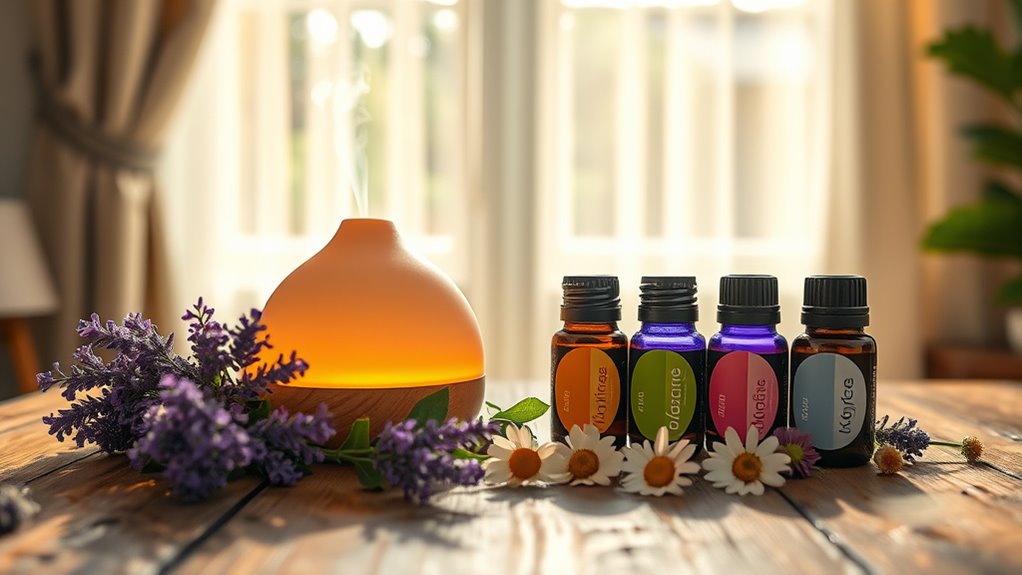
Many individuals have found that incorporating aromatherapy into their routines considerably reduces stress and promotes relaxation. Personal testimonials reveal how simple diffusing or applying essential oils can create a calming environment, helping you unwind after a busy day. Case studies support these experiences, showing measurable improvements in mood and anxiety levels. For example, some people report feeling more centered and less overwhelmed when using lavender or chamomile blends. These success stories highlight the real-world benefits of aromatherapy, making it a practical addition to your stress management toolkit. While everyone’s response varies, many users find that consistent use fosters a sense of tranquility and emotional balance. Research shows that essential oils can significantly influence mood and physiological responses, encouraging further exploration of aromatherapy’s benefits. Your own experiences may mirror these stories, encouraging you to explore different oils and blends to find what works best for you.
Future Directions and Ongoing Research in Aromatherapy

As interest in aromatherapy continues to grow, researchers are increasingly exploring its potential mechanisms and applications for stress relief. Futuristic scent technologies are emerging, enabling precise delivery of essential oils tailored to individual needs. These innovations aim to enhance effectiveness and consistency in aromatherapy treatments. Meanwhile, ongoing clinical trials are rigorously testing various essential oils and delivery methods to validate their benefits scientifically. You can expect future research to focus on understanding how specific scents influence brain chemistry and stress responses. Advances may also lead to personalized aromatherapy devices that adapt to your mood and environment. As these developments unfold, you’ll have access to more reliable, evidence-based options to incorporate aromatherapy into your stress management routine confidently.
Frequently Asked Questions
Can Aromatherapy Replace Traditional Stress Management Techniques?
You might wonder if aromatherapy can replace traditional stress management techniques. While it can be a helpful complementary therapy, scientific evidence shows it’s not a substitute for proven methods like exercise or therapy. Aromatherapy offers relaxation benefits, but relying solely on it may not address underlying issues. Incorporate it alongside other techniques for a balanced approach, knowing it supports your overall stress relief plan without replacing established methods.
Are There Any Age Restrictions for Using Aromatherapy Safely?
When considering age restrictions for aromatherapy, it’s important to follow safety guidelines to protect everyone. For young children, certain essential oils may be too potent and should be avoided or used with caution. For seniors, check for potential sensitivities or allergies. Always dilute essential oils properly and consult a healthcare professional if you’re unsure. Adhering to safety guidelines guarantees you enjoy aromatherapy benefits safely at any age.
How Long Do the Effects of Aromatherapy Typically Last?
Imagine the gentle whisper of a calming scent lingering in the air, and you wonder how long that soothing effect lasts. The duration effects of aromatherapy vary, typically lasting from 30 minutes to a few hours, depending on the scent’s potency and your environment. Scent longevity depends on factors like diffuser type, oil quality, and individual sensitivity, so you might find some blends stay with you longer than others, creating a calming ripple effect.
Can Pregnant Women Safely Use Essential Oils for Stress Relief?
You wonder if pregnant women can safely use essential oils for stress relief. It is crucial to note that pregnancy safety varies with each oil, and some may pose risks. Always follow essential oil precautions and consult your healthcare provider before use. Generally, certain oils like lavender and chamomile are safer, but others should be avoided. Prioritize safety to ensure both your well-being and your baby’s health during pregnancy.
What Should I Do if I Experience an Allergic Reaction?
If you experience allergic symptoms, act quickly and stay calm. Recognize the signs—such as itching, swelling, or difficulty breathing—and take immediate emergency actions. Remove yourself from the source of the allergen, rinse the affected area with water, and consider taking an antihistamine if appropriate. If symptoms worsen or you have trouble breathing, seek emergency medical help immediately. Prompt action can prevent serious complications and guarantee your safety.
Conclusion
Remember, the power of aromatherapy lies in simple, consistent use—like planting seeds for a calm mind. While research continues to grow, trusting your senses and experimenting with blends can help you find what truly relieves stress. Keep in mind, Rome wasn’t built in a day, so be patient and gentle with yourself as you incorporate these calming rituals into your routine. With time and care, you’ll create a peaceful space to unwind and recharge.
